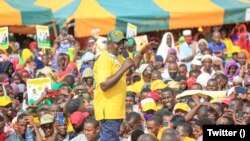At 1800UTC, Reuters reported In the presidential race that official verified results put out by the Nation media group showed Ruto taking 51% of the vote, ahead of left-leaning opposition leader Raila Odinga who had 48%.
A Reuters tally of 263 out of 291 preliminary constituency-level results at 1800 GMT on Sunday showed Ruto in the lead with just under 52% and Odinga at 47.5%. Two minor candidates shared less than a percent between them.
Reuters did not include 19 forms in the count because they lacked signatures, totals, were illegible or had other problems.
The preliminary tally is based on forms that are subject to revision if any discrepancies are discovered during the official verification process.
Agence France-Presse reported as of 17:00UTC that the Daily Nation newspaper said Ruto had scored 52.46 percent of the vote, while Odinga had 46.87 percent, citing official data.
Reuters was unable to get access to the official running vote tally for the presidential race on Sunday. A live feed displaying the results at the national tallying center had disappeared hours earlier.
The Independent Electoral and Boundaries Commission (IEBC) which has now tallied votes from just over 60 percent of constituencies, did not give an explanation for the decision to shut down its live tally board
When asked about the tally, a spokeswoman for the commission referred Reuters to the live feed. Other electoral officials said they were unable to provide the information.
IEBC chairman Wafula Chebukati has accused party agents of delaying the tallying process by haranguing election workers with unnecessary questions.
Riot police were deployed overnight inside the commission's heavily-guarded tallying center in the capital Nairobi after political party agents disrupted the process, hurling rigging allegations at each other.
More than a dozen civil society groups, trade unions as well as the Kenyan chapters of Amnesty International and Transparency International issued a statement Sunday urging calm.
"We call on all political candidates, their supporters and the public to exercise restraint. We must all avoid raising tensions that could easily trigger violence," the 14 organizations said.
Both candidates have pledged to maintain calm, with the memory of the 2007-08 and 2017 post-poll violence still fresh for many Kenyans.
At a church service in Nairobi on Sunday, Odinga, 77, recited the opening lines of the Peace Prayer of St Francis and said: "I want to become an instrument to bring peace, to heal, to unite and keep the hope alive in our country."
In Ruto's Rift Valley bastion of Eldoret, the clergy and congregants alike called for calm and patience.
"We have come here to pray for peace, for our country, for our politicians to ask them (to) be very cautious and prudent in their utterances," said bishop Dominic Kimengich.
"We have gone through this as Kenyans, we know that any imprudent remark... can easily trigger conflict and that's what we don't want," he told AFP.
The election is being closely watched by an international community that views Kenya as a pillar of stability in a volatile region.
Turnout was about 65 percent, much lower than the 78 percent recorded in 2017, a reflection, some observers say, of the disenchantment with the political elite, particularly among young people.
The winner of the presidential race needs to secure 50 percent plus one vote and at least a quarter of the votes in 24 of Kenya's 47 counties.
If not, the country will be forced to hold a runoff within 30 days of the original vote.
Observers say that with the race so close, an appeal to the Supreme Court by the losing candidate is almost certain, meaning it could be many weeks before a new president takes office.
This report contains information sourced from Reuters and Agence France-Presse.
